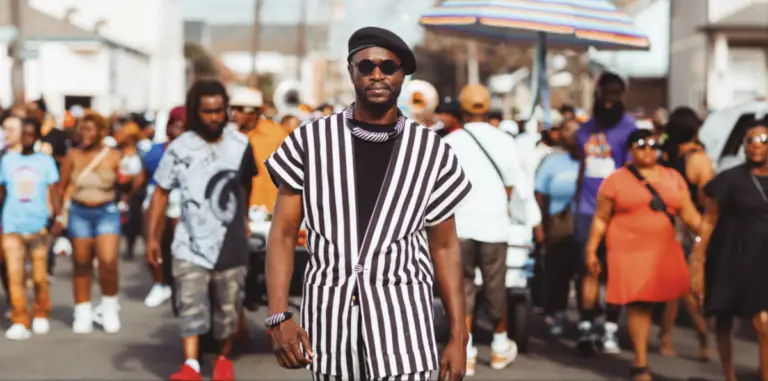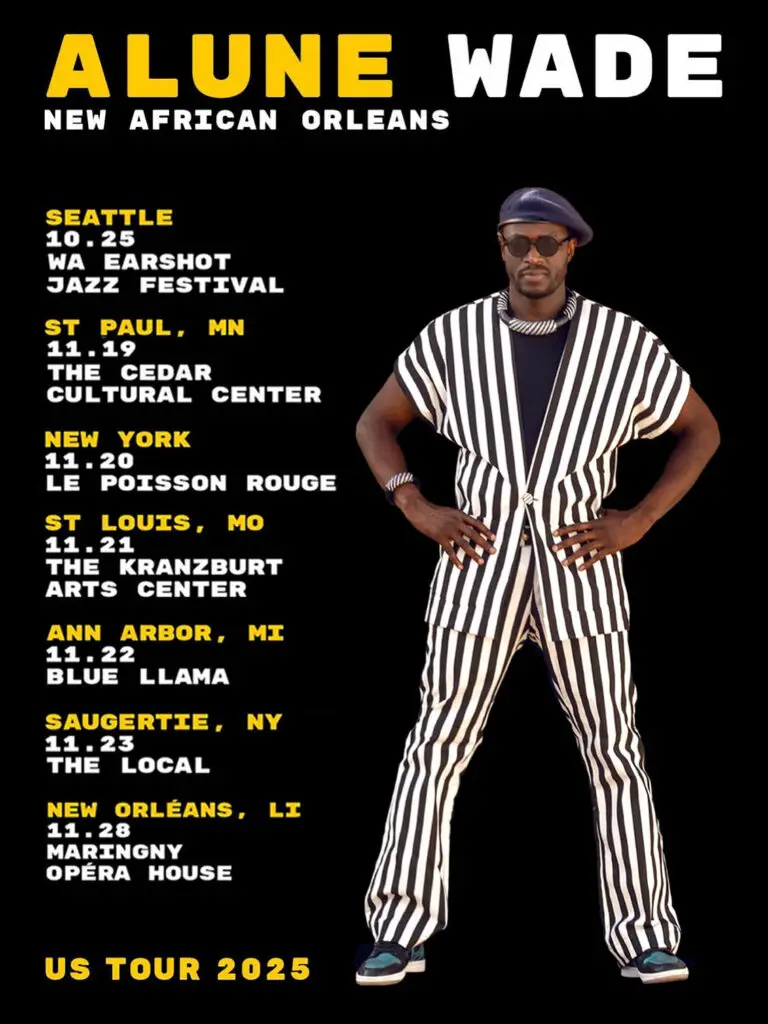Senegalese bassist and composer Alune Wade will embark on a North American run of shows in November, spanning from the Midwest to the Northeast, where he will explore the junction between his native West African rhythms and brass band music from New Orleans that is captured in his sixth studio album, New African Orleans.
Among the stops are Le Poisson Rouge and The Local in Saugerties in the week prior to Thanksgiving.
Alune Wade explores a geographic span of music that is interconnected for half a millennia – rhythms of West Africa, Afrobeat and juju from Lagos, Nigeria and the brass band sounds that were immortalized in New Orleans. “I’m exploring a world that goes from my roots to the lost branches on the other side of the Atlantic,” explained Wade.
Taking 50 compositions and trimming them down to 12, the tracks were recorded in Paris, France, Dakar, Senegal, Lagos, Nigeria, and New Orleans. “The idea first came to me during the Jazz à Gorée festival I organized back in 2014,” he explained. “It had me reflect on the notion of reversing the musical trip most people take from the United States to the African continent. I wanted to set out westward and begin a musical conversation with the best artists, both in Nigeria and the US.”
To achieve this, Wade has invited top artists from both sides of the Atlantic, including the Nigerian talking drummer Olaore Muyiwa Ayandeji, the percussionist Weedie Braimah and the jazz drummer Herlin Riley from New Orleans. The musical inspirations are equally transatlantic, ranging from Dr. John to Manu Dibango and Charlie Parker. But Alune also pays homage to his father who was a brass band star in his native Senegal back in the Sixties.

Wade begins this exploration with three new versions of global standards. This features a biting reinterpretation of “Watermelon Man” by Herbie Hancock. Alune transforms this 1962 hard bop standard into a vibrant song dominated by his Afrobeat bass drive and sharp guitar solos. This is followed by an energetic version of Jimi Hendrix’ classic “Voodoo Child” which Alune sings in his native Wolof. On “Water No Get Enemy,” Alune slows down the tempo and makes a dreamy version of this standard which underlines the power of nature. The lyrics also suggest that if a country’s political opposition works with nature, its victory is guaranteed.
After these standards, the West African bass player focuses on several original compositions which explore the New Orleans sound, with its brass front line of trumpet, clarinet and trombone allying itself with syncopated rhythms and a strong backbeat. These sounds complement lyrics about the universality of food (“Same Foufou”), hospitality on both sides of the Atlantic (“Three Baobabs”) and the perils of travel (“Taxi Driver”).
The boogie woogie and juju styles from the east and west coasts of the Atlantic Ocean are like a brother and sister torn apart by the vicissitudes of History. In composing this song “Boogie & Juju”, Wade conjured up pictures of, on the one hand, Little Richard fusing boogie-woogie, New Orleans R&B and the gospels, and, on the other, the Nigerian juju of King Sunny Ade and the Assiko rhythms from Cameroon, played on a bottle with metal. These harmonize seamlessly to evoke the chanting at football matches in Senegal which echo into the samba from Salvador de Bahia. The song features a strong brass section led by New Orleans trumpeter Andrew Baham.
Alune returns to the underlying theme of the album with the song From Congo to Square, featuring Afro American singer Somi, recounting the odyssey of brass band music, how kernels of brass were shipped across the ocean from the west African coasts and grew under oppression and violence. The clarinet, bass, saxophone and voices featured describe this odyssey which began in the square in 1724.
Alune’s interpretation of “Gris Gris Gombo Yaya,” the 1968 underground classic by Dr. John, captures the mystique of swampy South Louisiana as the Senegalese bass player delivers a powerful Afrobeat version of this ageless New Orleans standard. The New Orleans icon is known for having resuscitated a mysterious 19th century artist who signed his compositions ‘Dr. John Creaux’ (hence Dr. John’s stage name). Unconfirmed rumors claim that Creaux was a Senegalese prince reduced to enslavement in Cuba who went on to gain his freedom as a sailor who settled in Congo Square. Again, an intriguing possible link to Alune Wade’s native homeland.
These songs are a powerful tribute to the resilience and impact of songs rooted in Africa which survived the horrors of the Middle Passage and gave birth to some of the most important music our societies know, sounds which bathed Alune’s musical education from the start. Indeed, there is a more personal reason for this album. His father, Serigne Fallou Wade, played the French horn and was one of the stars of the Senegalese Army brass band. After studying in the Paris Conservatoire, he became a key member of the band, composing music which mixed traditional Senegalese sounds with classical brass band fanfares. The band was founded in 1961 for the nascent nation and Alune’s father shared his love for brass band compositions with his family throughout his upbringing.

We only have a partial idea of the birth and remarkable development of the music born of the transatlantic slave trade. From Malinke ballads to Cuban son, from call-and-response patterns to field hollers and hip-hop, Yoruba rhythms to Argentinian tango, from Angolan percussions to the New Orleans brass band sounds… all have roots in Africa and a shackled migration that lasted four centuries. No more so than Congo Square in the Louisiana capital.
2024 marked the 300th anniversary of the implementation of the Code Noir which “gave enslaved Africans Sundays off to dance”. A drop in the ocean, but one which shows the importance of culture as a lifebuoy against this barbaric trade. As the Guadeloupian writer Daniel Maximin once claimed: “Our music guided us from the scream to the song, from dragging our chains to dancing.”
Alune Wade North American Tour Dates
Nov 19 – The Cedar Cultural Center – St. Paul, MN
Nov 20 – Le Poisson Rouge – New York City, NY
Nov 21 – Kranzberg Arts Center – St. Louis, MO
Nov 22 – Blue Llama – Ann Arbor, MI
Nov 23 – The Local – Saugerties, NY
Nov 28 – Maringy Opera House – New Orleans, LA
→ Continue reading at NYS Music
